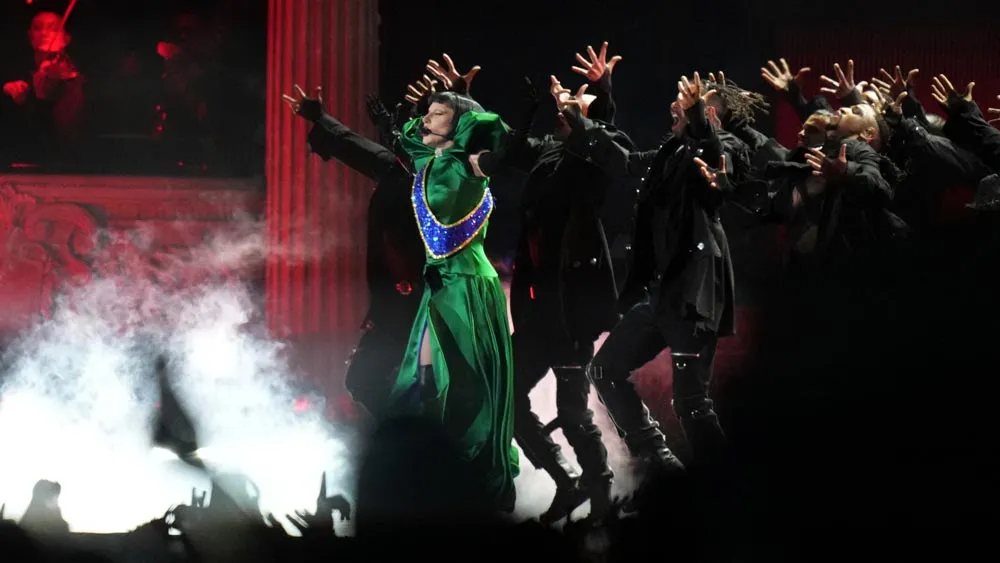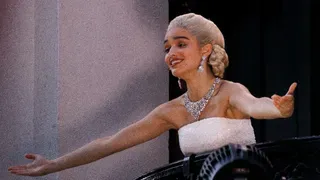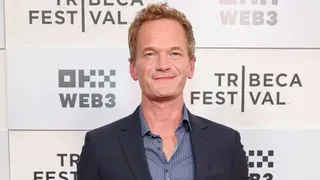April 24, 2008
French kissing in the USA
Michael Wood READ TIME: 6 MIN.
Trinity Rep transports us to Paris by Night
Take a romantic trip to Paris - or rather, Hollywood's memory of Paris - in the play with music Paris by Night, making its world premiere this weekend at Trinity Rep. Written and directed by Trinity's Artistic Director, Curt Columbus, the story follows the adventures of a quartet of people looking for love in Montmartre, against a seedy background of boxers, bohemians and chanteuses. Officially the show has been in the works for ten years, but its influences stretch back to the late 50s and early 60s. Columbus spoke with Bay Windows about combining the realism and eroticism of early gay fiction with the gloss and romance of classic movie musicals, and why the world needs a gay play without the angst.
Q: So you're in crunch time now.
A: Yes, but we've been very fortunate with this process to have lots of developmental time. I feel like what I've been able to do is really look at the play, to really interrogate what can be done. We've made a lot of changes, and I'm working with the most talented people in the world. I've always loved this company, but we've had the best time with this show. We've enriched it and refined it.
Q: This is exactly the environment you wanted to foster when you came on as Artistic Director two years ago.
A: And I'm not the kind of writer who works in a lonely garret. I'm just not that bright, frankly. I need to be in a room with actors and have them tossing it around.
Q: I understand the script began with a hodgepodge of literary influences, like Jean Genet and James Baldwin.
A: It comes out of that thing you do when you come out. Well, I don't know what they do today, but when I was 26 I immediately started reading literature to try to understand who I was, because there was no information in the mainstream media.
Q: Right, and you quietly go to the library and methodically read everything on that one shelf. I did that. I was kind of overwhelmed when I got to City of Night.
A: What's City of Night?
Q: The memoirs of a hustler.
A: That's so funny, the first song in our show has the lyric "daybreak in the city of night." It's a play on Paris being the city of lights. I guess you're adding something to my list, I'll have to check that out.
Q: But when you were in that phase, you must have come across stuff that freaked you out.
A: Are you kidding? All the time! Have you read any of Anne Rice's gay male erotica? It's terrifying! I was just trying to find who I was, and in a lot of ways I wrote this for the 17 year old gayboy musical theater queens trying to figure that out and wondering why there aren't any characters for them in the musical theater canon.
Q: That is an irony, that we have such a stake in musical theatre while there's so little overt space for us in it.
A: One of my earliest members is being ten years old and memorizing the 8-track of The Sound of Music. How did they not know I was gay?
Q: So how did you take these eclectic influences and transform then into something that sounds so carefree and bubbly?
A: I just get tired of all the work about gays and lesbians feeling shrill and dark and angry. We tend to participate in the extension of our own stereotypes, you know? It used to be in Hollywood movies you'd know that the gay guy and the black guy were going to die. Now sometimes the black guy's the hero, but the gay guy still dies. Look at Brokeback Mountain. We're not all pathological freaks! Not all the time. So this is an homage to the movie musicals of my childhood. Audrey Hepburn and Leslie Caron in the city of lights, dressed in Givenchy and making love to Cary Grant. I wanted to be them, with the fabulous sunglasses and making love to Cary Grant. Why can't issues of sexuality be treated in that realm as well? Maybe that's silly but...
Q: But the fact that you're taking this old-fashioned and very straight idea of romance, and doing it with gay characters, and doing it sincerely, that's actually significant because it's unusual.
A: Well I hope so, so that the gay kids can come because it won't be known as the controversial play. It's pretty songs, pretty costumes, and five chaste kisses. Don't we want to reclaim that image for ourselves? Sometimes you just want things to be pretty and sweet.
Q: Right, this is a type of escapism that we don't actually see much of in the gay community.
A: Right, we have to go to the big heavy story about a gay guy in a concentration camp, or dying of AIDS. Even Angels in America, which I adore, has this random butt sex scene to make the straight people uncomfortable. What if there's not a butt sex scene? What if there's singing instead?
Q: There's no butt sex in An American in Paris!
A: My publicist is not going to be happy about what I'm saying. I have a potty mouth.
Q: On the plus side, my readers will love it. Anyway, I was saying that it sounds like there's a sincerity to Paris by Night that's unusual for gay theater, and musical theater in general. I feel like we get so much sarcasm and pastiche and edginess, and things that are very calculated like the Disney musicals.
A: Frankly, I don't consider those musical theatre. Look at Cabaret. Nothing in Cabaret is in quotes. It's just a brilliant show about the descent to Nazism, and you're invested in the characters. The contemporary musical form drives me out of my mind. They're not writing musicals anymore. This is why I'm adamant that Paris by Night is not a musical, it's a play with music, because I'm focused on telling a story. I went and saw Spamalot and had a blast. They shot confetti cannons at us and there were fart jokes and it was very fun. But is that a musical? The Producers? A great show, but not a musical. Because it relies on the fact that you've seen a movie and it plays with your expectations.
Q: So how come they get to keep the word musical?
A: Oh, well, a lot of my colleague in the American theatre get to keep the word theater.
Q: Oh, damn.
A: Oh, I'm a much bigger asshole than you could ever imagine.
Q: I don't even know what we're talking about now.
A: That happens a lot with me.
Q: I was wondering about the design of the show. Are you drawing on some of that classic Hollywood imagery?
A: Eugene Lee is doing the sets, and he's a lunatic. He did the set for Wicked. He's a mad genius. He's given us an all-black set that's absolutely brilliant. Bill Lane is doing costumes, and Givenchy was one of his favorite designers. The women's costumes are incredible.
Q: And I imagine they'll really pop off that black set.
A: Right, it's all about lighting and how that interacts with the black, and how things stand out in front of the set.
Q: I'm suddenly picturing Umbrellas of Cherbourg.
A: That's it exactly! You must be a musical theatre queen.
Q: Actually I hate that movie.
A: Oh, no! Doesn't the ending make you cry?
Q: Yes actually, but it's the only part of the movie where I care.
A: But the visual landscape of that movie is exquisite. I love it because I keep thinking, could it get any weirder? That's one of the big visual references.
Q: What about the music by Andre Pluess & Amy Warren?
A: Cool jazz. Late 50s, early 60s, inspired by women like Anita O'Day and Lena Horne and Billie Holiday. We've got a little trio and we're focusing on the idea of the voice being the fourth member of the combo. This is another reason I hate to call it a musical, because there's only one number that's a number, you know?
Q: The whole production sounds very sleek.
A: I don't think that's the word. Because it takes place in Montmartre and it's kind of rough. It's a world of nightclubs and tattoo parlors, so it's beautiful but it's got a rough edge. It's a world where race doesn't matter because everyone's downtrodden. But certainly there's an early 60s quality to the clothing, and there's the sheen of our black set. But sleek makes me think streamlined.
Q: More like Bob le Flambeur, maybe.
A: I don't know that one.
Q: I bet you would find it interesting. It's a noir movie about an old gambler in Paris. I think Melville directed it.
A: I love noir. Especially early 60s noir, as opposed to the 40s noir.
Q: By then it was getting weird.
A: Yeah! And the Christopher Lee Dracula movies. Lurid movies with saturated colors and glossy backdrops. Pulsing. Our show isn't sleek, it's pulsing. Especially when the boys take their shirts off.
Q: You can't mention that often enough.
A: It really doesn't hurt.
Paris by Night opens Friday April 25 and plays through June 1 at Trinity Rep, 201 Washington St., Providence R.I. Tickets $20 - $60. Info: 401.351.4242 or www.trinityrep.com.
Michael Wood is a contributor and Editorial Assistant for EDGE Publications.







